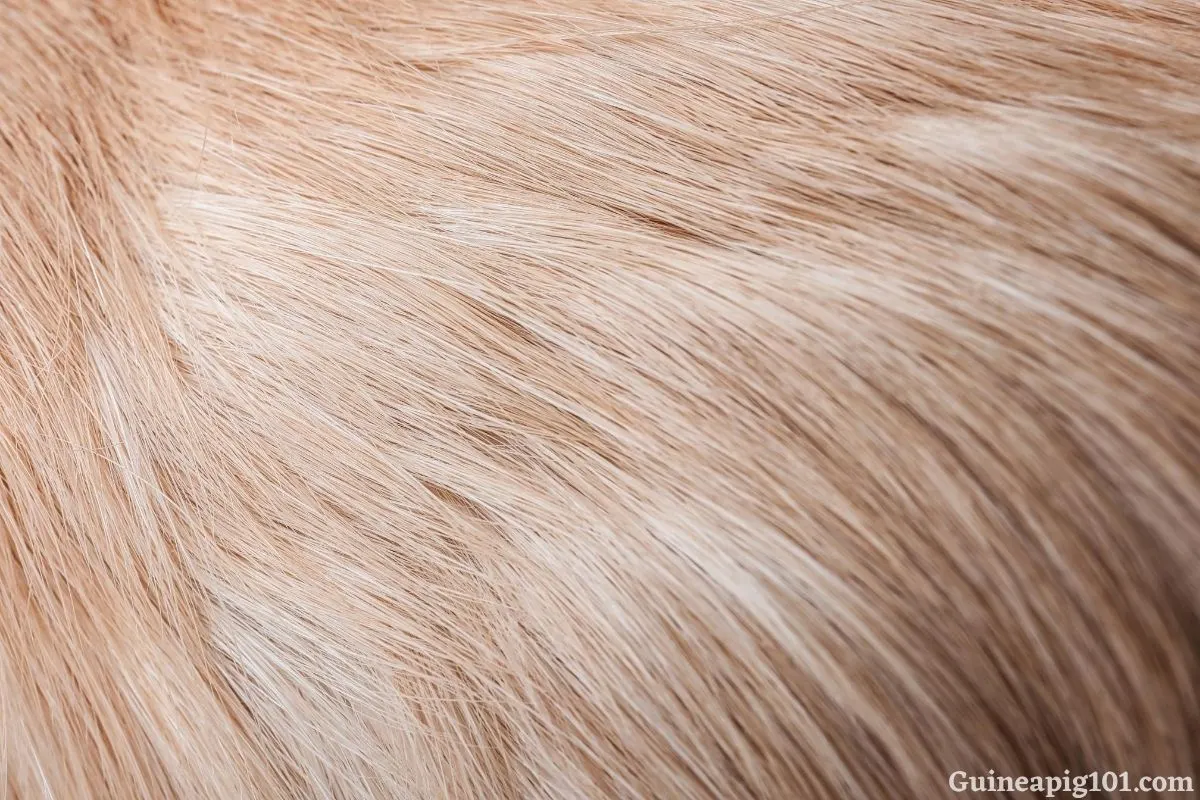Ticks are those insects that suck the blood of your guinea pig. They attach themselves to all the household pets, as this is the source of their feeding. Guinea pigs are not a particular case for this. These can be harmful for your guinea pigs and thus you need to remove them. But how to get rid of ticks on guinea pigs? Let’s find out!
With the help of tweezers, try to eliminate each tick carefully. Don’t wait for the ticks to fall naturally from your guinea pig. Make your guinea pig’s enclosure free from humidity, keep the grass of your yard short, and use guinea pig-friendly ticks repellent around their enclosure.
The infection caused by ticks can cause life-threatening conditions for your guinea pig.
Your guinea pig’s health would be in danger as long as a tick feeds on your guinea pig. Ticks can remain inactive for some time, and as soon as they find the right condition, they start multiplying.
It means that it can lead to a severe infestation and fatal condition if left unchecked. So, This guide will describe how to keep your guinea pig safe from ticks.
What are the symptoms of ticks on guinea pigs?
Guinea pigs can have swelling across their bodies once ticks start feeding on them.
An active tick has a considerable size, as their bodies are filled with blood. Maybe this seems like a pimple at first. But soon, the difference will be clear.
It is hard to see the ticks on those guinea pigs who have long hairs. They will hide themselves under your guinea pig’s fur.
It is crucial to pet and groom your guinea pig regularly. Take a look if you find that your fingers come across to a pimple or a bump. Look closely and remove it if it’s a tick.
In some cases, your guinea pig will become unhealthy because of a tick. Your guinea pig will lose blood if they have many ticks on them. Anemia could be an effect of this. This will be prevented if you remove the ticks from them before they can eat their fill.
When ticks bite on guinea pigs, some of them also go through paralysis and muscle weakness. Check them over, if you realize that your guinea pig’s legs are weaker than before.
Also, this could be suggested that the ticks are spreading the infection in your guinea pig.
Different types of ticks
There are different types of ticks, with different habits and life cycles. There are two main species but both of them are equally harmful. These are listed below:
- Argasid ticks: These ticks lack the outer shell. As it is hard to find out their head, this makes it difficult to get rid of. However, they do not survive for long.
- Ixodid ticks: These ticks have a strong outer shell that covers their body. These forms of the tick are the most common.
In the life cycle of these ticks, they have three stages. They begin with a hatchling larva. These larvas are very small, as human eyes can’t identify it.
These ticks are rarely found on guinea pigs. These ticks find minor hosts, for example, rats or birds.
They will drop off and progress into their second stage of life if a larva nourishes enough from this host. This is known as nymphs. A nymph can nourish on a guinea pig.
The nymphs will become a mature tick if they live in this process. Again this will lead the tick to search for a host. Guinea pigs are famous with mature ticks, as their bodies are low to the surface.
After nourishing on this third host, male ticks will pass away. Females ticks will fall off and lay eggs. A female tick can lay over 3000 eggs in their lifecycle.
How do guinea pigs get ticks?
If your guinea pigs live outside, or around with other creatures who go outside, then the tick can attach with your guinea pig.
There is also a possibility that the ticks got on your guinea pig while they were playing in your backyard.
The simplest way to get rid of ticks on your guinea pig is to pull them off yourself.
Talk to your veterinary surgeon about getting an anti-tick treatment to avoid health problems and anemia.
How long can ticks stay on guinea pigs?
A tick can live on a guinea pig for three to four days if it is not removed physically. By this time, it gets straightforward to spot the ticks as they have grown significantly in size.
Ticks are not that attractive for looking at, especially when they are engorged enough.
Most of the people find themselves repulsed by the appearance of them. But for your guinea pig’s health, you will need to get over from this. Do not wait for a tick to fall off on their own.
Take action, once you discover that these ticks are on your body. Ask somebody to help you with it, if you can’t do it by yourself.
Where do ticks attach on guinea pigs?
These tricks are especially drawn to four parts of guinea pig analysis.
- Face
- Dewlap
- Ears
- Legs
These parts of the guinea pig’s body provide sufficient nourishment and are appropriately soft for the tick.
Grooming can disclose the existence of ticks in these areas of your guinea pig.
How do I get rid of ticks on my guinea pig?

The tick should be removed whenever you find them attached to your guinea pig. There will be a higher risk of infection and other diseases if they remain attached to your guinea pig for a long time.
Ticks will drop off naturally if they eat enough, and stay alive. That will allow them to lay eggs, and then they will attach to the next host. This can lead to severe infestation.
Follow these steps to remove these ticks from your guinea pig safely.
- Gather all your supplies together. You will need a bottle of rubbing alcohol, guinea pig-safe disinfectant, gloves, and fine-pointed tweezers. Also, you can take antibiotic lotion for aftercare.
- With the help of a fine-toothed comb, brush your guinea pig’s fur and find the tick. When ticks are feeding, then it would be easy to detect them.
- Wear your gloves and use the tweezers to snatch the head of the tick. Do not target the tick’s body, and always aim for their head. The body is full of blood and can burst.
- Pull it out in one liquid motion once you have a firm grasp on the head of the tick. Don’t try to jerk and twist their head as the parts of the tick will stay in your guinea pig’s fur.
- They have been removed but they will still be alive. Put the ticks in rubbing alcohol to eliminate them.
- Clean the infected area where the tick has bitten your guinea pig and apply a topical antibiotic on it.
- Lookout at the infected area for a few days. Minor swelling can be there for a day or two. Though, this should go away soon enough.
Ask a veterinary nurse for help if you are nervous and not able to remove the tick by yourself. That is also preferable if you are worried about infection.
Can ticks kill guinea pigs?

An isolated tick nourishing on a guinea pig will not be harmful. Your guinea pig body will become weaker, but it will not take enough blood to cause a life-threatening situation for your guinea pig. However, several ticks can do this.
It is essential to know that ticks can spread a life-threatening infection to guinea pigs. Due to this, ticks can be very critical for your guinea pig’s life.
Some of the life-threatening infections that ticks can spread to your guinea pigs include:
- Lyme Disease
- Tularemia, also called guinea pig fever
- Papillomatosis
- Myxomatosis
Can guinea pigs carry ticks among themselves?
Two guinea pigs can experience infestations from the same tick. Here is an example of how this can happen:
- Two guinea pigs, for example, X guinea pig and Y guinea pig, share an enclosure.
- X guinea pig is bitten by a tick while exercising outside. Y guinea pig runs away from there.
- Both of the guinea pigs returned to their enclosure. The tick on the X guinea pig remains hidden.
- The tick starts feeding on an X guinea pig. Finally, once full, it falls off initially.
- The tick now has a limited amount of time to find their next target, or they will pass away. They will discover Y guinea pigs and attach themselves to them.
- If the tick fails to find another host to feed. Then again, they can feed on X Guinea pig. This process can continue until the ticks pass away.
Also, a female tick will lay eggs in your guinea pig’s shared enclosure. Then your guinea pigs will be trapped with thousands of ticks in an enclosed area.
That is why we can’t ignore the ticks. Check your guinea pig and remove the ticks if you find them. Also, look out for was to prevent ticks in the future.
Can guinea pigs spread ticks to another animals?
It is not necessary that ticks only want to feed themselves off your guinea pigs. Most of the ticks are comfortable feeding on a cat or dog. Sometimes they even end up biting human beings.
You must check all the animals for ticks if you have multiple pets in your house. More pets you have, the more ticks there will be. In return, this means that the ticks will lay eggs and live long.
Not only for guinea pigs, take preventative standards to keep your all pets away from ticks. If you find these insects, remove them quickly, and also check your other pets.
Ticks carry many infections. Some of these will not make an impact on guinea pigs but in dogs and cats. Cytauxzoonosis, Rocky Mountain Spotted Fever, and Piroplasmosis are some of the examples.
Preventing ticks on guinea pigs

Preventing a tick to attach with your guinea pig is better than separating them after the occurrence. The ticks will be soon passed away if they can not feed themselves. As a result, the risk of an infestation will be reduced.
Daily trim the grass of your garden if your guinea pig exercises outside as ticks grow in the long grass. They can not cover themselves in Shorter grass. Brush away any piles of leaves, and don’t allow your guinea pig to play on them.
In every pet shop, tick repulsive sprays are available. Though, whenever you purchase a product, make sure that it is designed for guinea pigs. Tick procedures for cats and dogs are hazardous for your guinea pig.
Don’t place a tick or flea collar for your guinea pig, which is built for cats as this will make your guinea pig unhealthy. These collars release a strong chemical that is bad for our guinea pigs.
By keeping your guinea pig enclosure clean and Changing your guinea pig’s hay daily, will also help you to get rid of tick infestation. On such occasions, the ticks will not find any place to hide and will eventually pass away.
Natural tick repellent safe for guinea pigs
The smell of some distinct foods can repel ticks away. Be aware of it as this will not eliminate them. That will just repulse ticks.
To make a natural tick discouragement:
- Mix two cups of apple cider vinegar or white vinegar with a cup of water.
- Add one tablespoon of vegetable oil. That includes sulfur, which also puts off ticks.
- Squeeze a Lemon juice into it if your guinea pig is not allergic to lime.
- Take a spray bottle, and pour them into it after mixing these quantities.
- Now you can use it around their enclosure to keep ticks away from your guinea pigs.
Of course, you will need to be careful before using this method. Don’t let your guinea pig lick it and make sure that the spray drops should not get in the guinea pig’s eye.
Immediately stop using the spray if your guinea pig shows any sign of discomfort.
But still, you need to check your guinea pig for ticks. Sometimes ticks can develop a tolerance to such natural repellent. So, be mindful of that.
Can ticks spread in winter?
Summer and spring is a season of the tick. During the winter, most ticks are inactive. However, some of them still grow. All of this means that you can never slow down on your attentiveness.
Ticks do not get erased by cold weather. They will go into the form of remaining inactive when the temperature falls. However, if a host hands over itself, they will still connect themselves.
Even in a harsh winter, try to maintain your anti-tick regime. If you don’t keep up with the control, you may see a severe infestation during the spring.
How to get rid of tick infestation in house?
Most of the ticks will not formulate their way into your house by their choice. The ticks may lay eggs if they remain attached to your guinea pig and are not wiped out. Also, this can lead to infection inside the house.
Ticks are very nasty as they are attached to dirty laundry. The sense of smell will invite them. At your home, don’t leave the laundry lying around. It is better to use a robust basket. Wash your clothes immediately if you find them.
Wash those soft furnishings or garments on the highest heat on which a tick has hosted. Also, use an antibacterial agent in the laundry.
Clean your house correctly from top to bottom, once you are done with furnishing. Vacuuming can suck ticks out of the carpet and rugs. Wash all clothes on the highest heat they can tolerate.
You can pour the natural pesticide all-around your house once you are done with the cleanup. That will also terminate the ticks that endured on the cleanup. Just make sure that the pesticide is not dangerous to your guinea pig.
You will need to contact a skilled exterminator if these steps are not enough. We can not leave a tick infestation. Or else it will be hazardous for your entire family members and animals.
Removing ticks from a guinea pig is not an impressive job, but it is essential. Leaving your pets to solve this problem on their own is not suggested. You need to take some action on this immediately.
Sources: Lyme disease, Tick-Immune Guinea Pigs, Ixodes scapularis infestations of guinea pigs
